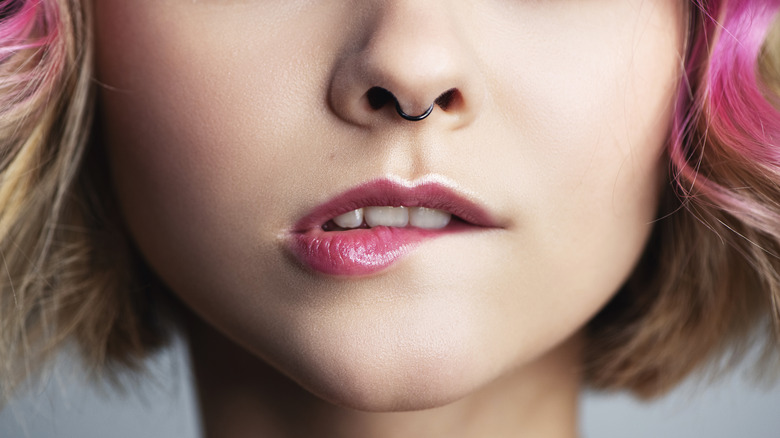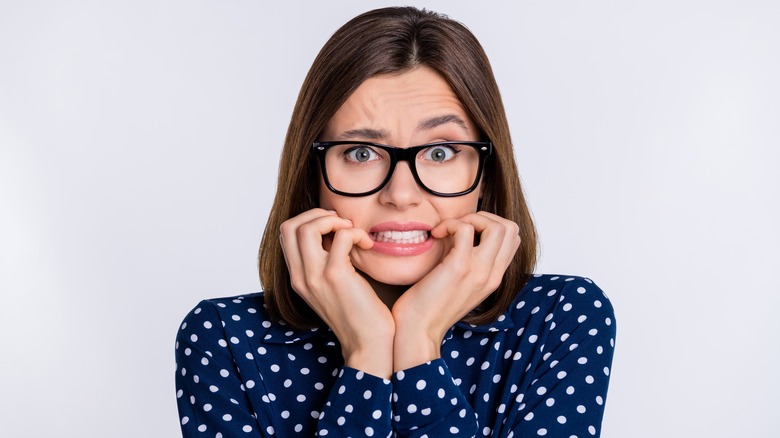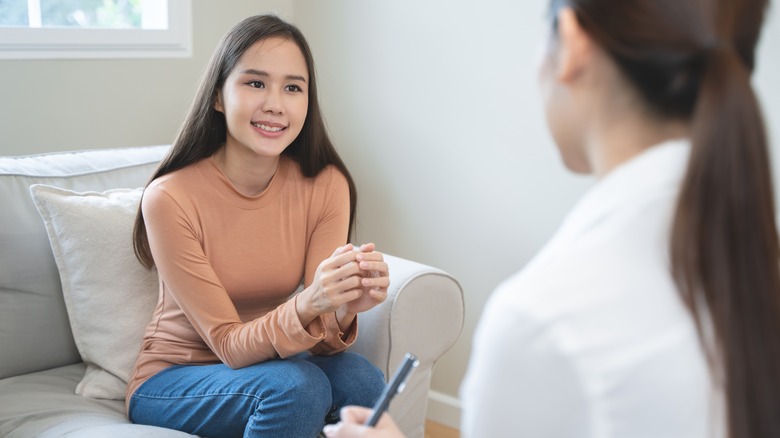What It Really Means If You Bite Your Lips
We've all bitten our lips from time to time. It can be incredibly frustrating when you're enjoying a delicious meal and suddenly bite down on your lip for no apparent reason. It's even worse when you are in a rush and trying to get out the door, so you eat fast and chomp down so hard you nearly see stars.
That can be inevitable when in a hurry though if it keeps happening, you may want to check in with your dentist to see if an overbite or some other dental issue may be causing it (via MedicalNews Today). Malocclusion occurs when your teeth are misaligned and can cause overcrowding and an overbite or underbite.
Most of the time, inadvertently biting your lip can be relieved by slowing down and being mindful. Eating slowly aids in digestion and helps maximize the nutrients you gain from the food, per Vogue.
However, there is another reason for lip voting which may be more difficult to kick.
Lip biting and anxiety
It's possible not even to be aware that you're biting your lips simply because it doesn't hurt. This often comes into play when lip biting takes place not when eating but when nervous.
Chronic lip-biting is a symptom of anxiety and can be a body-focused repetitive behavior (BFRB). This is a self-grooming habit that is repetitive and compulsive (The TLC Foundation). Other examples of BFRBs include nail biting, skin picking, and hair pulling.
Nail biting due to anxiety often arises at times when you're feeling overwhelmed or undergoing large amounts of stress (via Healthline). The first thing to do to overcome the compulsion is to be conscious that you do it, and then try to prevent yourself from doing it. Finding ways to counteract the physical act of lip biting can help. For example, try chewing gum to keep your mouth busy and go for walks to clear your head.
What to do if you can't kick lip-biting on your own
If you've tried to stop biting your lips on your own but nothing is working, it might be time to ask for help. When lip biting becomes long-lasting, it can result in long-term redness, lip sores, and even cracked and bleeding lips which can lead to infection (via MedicineNet).
It's best to seek a professional counselor who is skilled in treating anxiety disorders. Effective treatments include diaphragmatic or deep breathing where the breath comes from deep within your stomach instead of shallow breaths from the chest (via Calm Clinic).
Another technique is progressive muscle relaxation. This is utilized to create tension in a muscle and then allow it to relax. The idea is that if you tense and release several muscle groups you are, in effect, releasing tension which may help thwart anxiety.
Talk and cognitive therapy can also be helpful because they can enable you to vent stressful thoughts and underlying causes of your stress. A good therapist can help you process it all and move into better self-care habits.
If you or someone you know needs help with mental health, please contact the Crisis Text Line by texting HOME to 741741, call the National Alliance on Mental Illness helpline at 1-800-950-NAMI (6264), or visit the National Institute of Mental Health website.


